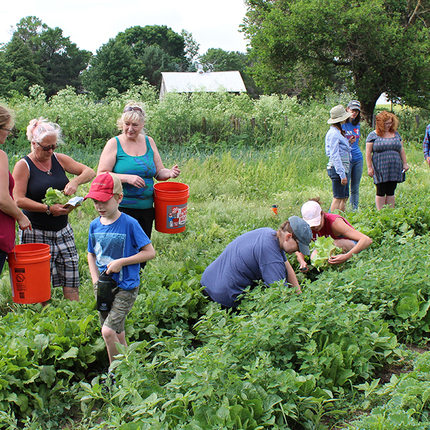Today, the National Sustainable Agriculture Coalition released findings from the first-ever comprehensive evaluation of the U.S. Department of Agriculture’s (USDA) Beginning Farmer and Rancher Development Program (BFRDP).
The report, "Cultivating the Next Generation," reveals the impact that this unique program – currently the only federal program explicitly dedicated to training the next generation of farmers – has had since it first received funding in the 2008 farm bill. Authors also look at factors that lead to more successful new farmer training projects, and identifies areas in which BFRDP can be improved to better support the next generation.
The Center for Rural Affairs was a part of an advisory team made up of beginning farmer practitioners and agricultural policy experts that informed the evaluation.
“With the 2018 farm bill on the horizon and Congress weighing the fate of many valuable USDA programs, it is now more important than ever that we be able to accurately assess their true impact,” said Juli Obudzinski, National Sustainable Agriculture Coalition deputy policy director. “BFRDP has been a critical support program for countless beginning farmers and ranchers, and this report helps put the importance of the program’s training and outreach efforts into perspective.”
BFRDP has had many successes over the last decade. The program is helping to grow the next generation of farmers, building up agricultural infrastructure, and continues to innovate new ways to support entrepreneurship through farmer training projects. Since 2008, BFRDP has invested roughly $150 million in more than 250 new farmer training projects across the country.
“Farmers entering agriculture today have very different needs than those who came generations before them,” said Obudzinski. “They are facing new and unprecedented challenges, challenges that training and outreach programs like BFRDP empower them to overcome.”
The report finds that BFRDP funded projects are showing real outcomes – surveyed project leaders estimated that over half of their participants are now engaged in a farming career, and that nearly three-quarters of them felt more prepared for a successful career in agriculture following program completion. BFRDP has also helped nonprofit and community-based organizations, along with their academic partners, to build their capacity and serve more farmers with better services.
Other key report findings include:
- Over 60,000 beginning farmers have been impacted directly by BFRDP projects;
- Almost all projects focused on farmers in their first five years of farming, with a significant focus on those farmers starting out at a small-scale;
- Over half of all projects served socially disadvantaged farmers as their primary audience;
- Over 90 percent of projects included farm business management training, and more than a third helped new farmers access land and capital; and
- More than two-thirds of projects offered intensive programs, lasting months or even several years, designed to move aspiring farmers quickly into production.
The report also includes recommendations on opportunities for improvement in the program, including: continuing long-term investments in new farmer training and evaluation, deepening farmer engagement in program development, and improving the grant reporting process to ensure consistency in outcome data.
“Interest in agriculture as a career is growing,” said Obudzinski. “And as our current generation of farmers and ranchers prepares for retirement, so too is our need for new, talented producers who can replace them. It is our hope that this analysis will provide a better understanding of the value and impact of BFRDP in training the next generation, and help to make the program even stronger going forward.”
To download the full report, visit: http://sustainableagriculture.net/publications/bfrdp/
The Center for Rural Affairs is a member of The National Sustainable Agriculture Coalition, a grassroots alliance that advocates for federal policy reform supporting the long-term social, economic, and environmental sustainability of agriculture, natural resources, and rural communities. Learn more and get involved at: http://sustainableagriculture.net
About the Report: The report’s two lead evaluators, Jan Perez from the University of California-Santa Cruz and consultant Ann Williams, have years of expertise evaluating beginning farmer training programs. This evaluation was also informed by an Advisory Team of beginning farmer practitioners and agricultural policy experts. Advisory Team members include: Center for Rural Affairs, CROPP Cooperatives, Land for Good, Land Stewardship Project, the National Young Farmers Coalition, and the University of California-Berkeley.
This project was supported by the USDA-NIFA Beginning Farmer and Rancher Development Program (BFRDP).





